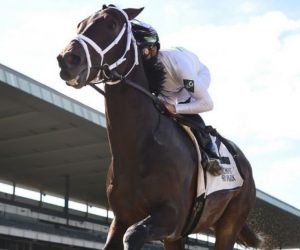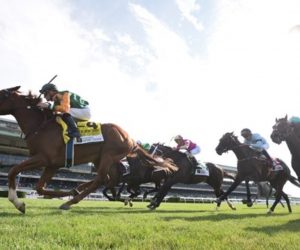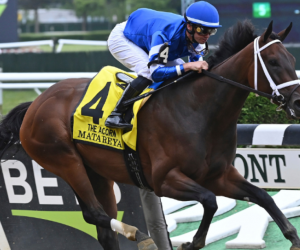Del Mar Thoroughbred Club (DMTC) is now undertaking extensive new safety initiatives. The popular seaside race meet in Northern San Diego County starts on July 17.

Track leaders say they’ll build on the track’s series of safety protocols and initiatives from previous years. They’ll do this by adding additional layers of protections this year. Del Mar is celebrating its 80th year of operation. In recent decades it’s the summer stop of the Southern California Thoroughbred circuit. Del Mar also conducts another brief race meet. That meet usually starts in early November.
A devastating rash of equine fatalities is currently bedeviling the sport in Southern California. The region remains one of the sports most important. At Santa Anita’s Winter/Spring meeting 30 horses succumbed to injuries and other physical issues, such as heart attacks. Those deaths are prompting a national outcry against the sport. Santa Anita owner, The Stronach Group (TSG), is in the midst of initiating a wide array of safety measures. These moves are fortifying procedures that include increasing the monitoring of all horses and trainers seeking to race at its California tracks. TSG and the New York Racing Association are currently barring Hall of Fame trainer Jerry Hollendorfer from stabling or racing at its tracks.
Del Mar has yet to say if Hollendorfer will be racing there.
Breeders’ Cup officials say its important event remains set for Santa Anita, despite the recent deaths.
Del Mar weathered its own rash of deadly racing injuries in 2016. That season 17 horses succumbed during the track’s summer racing season.Â
“Del Mar continues to strive to provide the safest environment possible for our equine and human athletes for both racing and training,†said Chief Executive Officer Joe Harper. “We have a responsibility to implement the best practices for safety and welfare and the further responsibility to educate the public about these practices and about the extraordinary levels of care provided to our equine athletes.â€
Safety Specifics at Del Mar
Among the new safeguards for the 2019 Del Mar season the track are:Â
- Entry Review Panel: All horses entered to race at Del Mar will be reviewed by a five-person panel consisting of: CHRB Equine Medical Director, Dr. Rick Arthur; two CHRB veterinarians – Dr. William Farmer and Dr. Timothy Grande; CHRB Chief Steward, Darrel McHargue and CHRB Safety Steward, Luis Jauregui. The panel will provide additional review of horses’ medical, training and racing history. The panel will recommend to the state stewards that any horse that it deems unfit for competition be scratched.
- Medication Reform: Del Mar is adopting additional reforms modeled after the International Federation Horseracing Association (IFHA) requirements. NSAIDs (non-steroidal anti-inflammatories), that were allowed previously up to 24 hours in advance of a race, will be restricted to 48 hours before either a race or workout. The time period that allowed therapeutic usage of corticosteroids in joint treatment has been extended from the previous length of three days before a race to 14 days and horses will not be allowed to start until after the 14-day window.
- Increases in out-of-competition testing: Random testing will be instituted for any horses stabled at Del Mar, including horses readying for – or having just completed – morning workouts.
- Enhanced stable security:Â Working in conjunction with the investigative staff of the CHRB, an enhanced stable security team will monitor all aspects of the stable area to ensure that rules are properly followed.
- Additional veterinary protocols for morning training: Veterinarians will be stationed at elevated observation points at the facility to oversee morning workouts and will have the ability – through communication with outriders – to remove horses from the racetrack and have them undergo a follow-up examination for soundness.
- Prohibit the use of the riding crop during morning workouts:Â Exercise riders and jockeys will be prohibited from using a riding crop to encourage their horses during morning workouts. Del Mar will continue to work with the CHRB and the Jockey’s Guild on additional guidelines for riding crop use.
- Stakeholder Advisory Committee: DMTC has created a stakeholder advisory committee represented by trainers, veterinarians, jockeys, racing surfaces maintenance personnel and management that will meet regularly to discuss safety practices, operations and track surfaces.
Taking Responsibility for Equine Welfare
“Significant thought, due diligence and stakeholder input went into the crafting of the reforms we are implementing this summer,†said DMTC’s Tom Robbins. “All of us recognize our responsibility to ensure the safety and welfare of the horses that race and train here.â€
Del Mar, after its own equine safety issues in 2016, cut back its summer racing season from eight weeks to seven. The goal: to provide more time for track preparation after the annual San Diego County Fair.
Additionally, nationally known trackman Dennis Moore took over surface maintenance. Fewer horses now stable at Del Mar. That creates a safer training environment during training hours. Increasing veterinary inspections is also part of the safety program.
Del Mar management notes that the most recent Jockey Club Equine Injury Database ranks Del Mar as among the safest major racetracks in the country. Its rate is 0.79 fatal injuries per 1,000 starts in 2018. The national average of tracks reporting was 1.68.
Additonally, Del Mar retains its full accreditation by the National Thoroughbred Racing Association’s Safety and Integrity Alliance.Â
The track conducts 36 programs through Labor Day Monday, Sept. 2.











